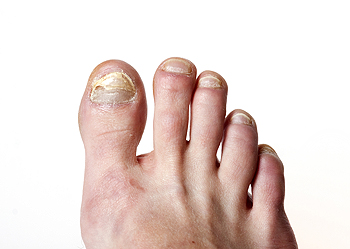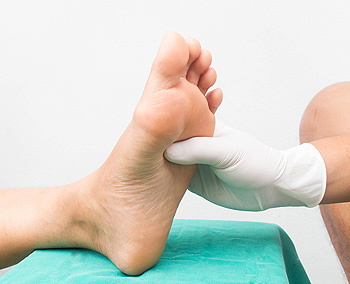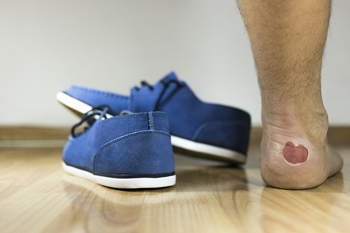Items filtered by date: August 2022
Are You Suffering From Ingrown Toenails?
Discoloration and Toenail Fungus

Sometimes, a toenail’s natural translucent color can be manipulated into an entirely different shade. One potential common cause of such discoloration is toenail fungus. Toenail fungus can be caused by an organism named dermatophyte. If your toenail has been infected by a fungus, you might notice that the shade of the nail has changed to yellow, reddish brown, black, or green. This discoloration can start small, for example underneath the tip of the affected nail, before growing larger in size if unaddressed. There are also several things that can increase one’s risk of developing a toenail fungus. If you sweat frequently, walk barefoot in warm and moist environments, or are prone to enduring small cuts near the nail, you may be at an increased risk of developing toenail fungus and potentially discoloration. Of course, discoloration can be caused by things other than toenail fungus. Namely, injuries, nail polish, and particular health conditions can also contribute to discoloration. However, it is important for you to be aware of the causal connection between toenail fungus and discoloration of the toenail. If you have discoloration of the nail, contact a podiatrist.
If left untreated, toenail fungus may spread to other toenails, skin, or even fingernails. If you suspect you have toenail fungus it is important to seek treatment right away. For more information about treatment, contact one of our podiatrist of North Texas Podiatry Associates. Our doctors can provide the care you need to keep you pain-free and on your feet.
Symptoms
- Warped or oddly shaped nails
- Yellowish nails
- Loose/separated nail
- Buildup of bits and pieces of nail fragments under the nail
- Brittle, broken, thickened nail
Treatment
If self-care strategies and over-the-counter medications does not help your fungus, your podiatrist may give you a prescription drug instead. Even if you find relief from your toenail fungus symptoms, you may experience a repeat infection in the future.
Prevention
In order to prevent getting toenail fungus in the future, you should always make sure to wash your feet with soap and water. After washing, it is important to dry your feet thoroughly especially in between the toes. When trimming your toenails, be sure to trim straight across instead of in a rounded shape. It is crucial not to cover up discolored nails with nail polish because that will prevent your nail from being able to “breathe”.
In some cases, surgical procedure may be needed to remove the toenail fungus. Consult with your podiatrist about the best treatment options for your case of toenail fungus.
If you have any questions, please feel free to contact our offices located in Euless and Southlake, TX . We offer the newest diagnostic and treatment technologies for all your foot care needs.
Typical Pregnancy Foot Problems

Although it might not seem immediately intuitive to some pregnant women, pregnancy can seriously impact and affect the feet. While a baby grows inside a pregnant woman, the woman’s center of gravity changes, forcing the feet to adapt. Additionally, during pregnancy, the woman produces a variety of pregnancy hormones that can have significant effects on the feet. One typical problem that you might encounter during your pregnancy is flat feet. Flat feet occur when the feet lose their natural arch and the entire foot presses directly against the ground when standing. Pregnant women can sometimes develop flat feet because as they gain a notable amount of weight, they exert more and more pressure on the feet, which can reduce the arch in the feet. Secondly, another common pregnancy foot problem is swelling in the feet. Swollen feet can frequently occur in pregnant women because, throughout the pregnancy, the pregnant woman’s body must produce a significantly larger amount of blood to support the growing baby. This excess of blood and fluids might sometimes lead to swelling in the feet. As a result, you might notice your foot size increasing, causing your feet to temporarily require larger shoes. If you are pregnant, it might be a good idea to reach out to your podiatrist who can help you manage symptoms on your feet.
Pregnant women with swollen feet can be treated with a variety of different methods that are readily available. For more information about other cures for swollen feet during pregnancy, consult with one of our podiatrist from North Texas Podiatry Associates. Our doctors will attend to all of your foot and ankle needs.
What Foot Problems Can Arise During Pregnancy?
One problem that can occur is overpronation, which occurs when the arch of the foot flattens and tends to roll inward. This can cause pain and discomfort in your heels while you’re walking or even just standing up, trying to support your baby.
Another problem is edema, or swelling in the extremities. This often affects the feet during pregnancy but tends to occur in the later stages.
How Can I Keep My Feet Healthy During Pregnancy?
- Wearing orthotics can provide extra support for the feet and help distribute weight evenly
- Minimize the amount of time spent walking barefoot
- Wear shoes with good arch support
- Wear shoes that allow for good circulation to the feet
- Elevate feet if you experience swelling
- Massage your feet
- Get regular, light exercise, such as walking, to promote blood circulation to the feet
If you have any questions please feel free to contact our offices located in Euless and Southlake, TX . We offer the newest diagnostic and treatment technologies for all your foot and ankle needs.
Baby Foot Care

Feet are critical parts of everyone’s body and babies are certainly no exception. If you are caring for a baby, there are several steps that you can take to ensure that their feet are healthy and taken care of. First, baby feet should not be physically restrained or restricted because physical activity and movement are what enable the baby’s feet to grow and develop. For example, when a baby kicks their feet, they are developing muscles in their feet. Second, ensure that any foot coverings your baby is wearing fit correctly. If your baby is wearing socks or booties when they are taken outside in cold weather, it might be smart to check regularly that they are not too tight. A baby’s body grows and develops at an astounding rate. Therefore, what fits a baby’s feet one month may not fit next month. Third, it can also be wise to regularly wash your baby’s feet to make sure that they are perfectly clean. However, if you do give your baby a foot bath be sure to completely dry their feet. If the feet are not dried properly, they could become soggy, which might create complications. If you are taking care of a baby, do not take any chances with the health of their feet. Contact your podiatrist for more tips and tricks about caring for baby feet.
Making sure that your children maintain good foot health is very important as they grow. If you have any questions, contact one of our podiatrist of North Texas Podiatry Associates. Our doctors can provide the care you need to keep you pain-free and on your feet.
Keeping Children's Feet Healthy
Having healthy feet during childhood can help prevent medical problems later in life, namely in the back and legs. As children grow, their feet require different types of care. Here are some things to consider...
Although babies do not walk yet, it is still very important to take care of their feet.
Avoid putting tight shoes or socks on his or her feet.
Allow the baby to stretch and kick his or her feet to feel comfortable.
As a toddler, kids are now on the move and begin to develop differently. At this age, toddlers are getting a feel for walking, so don’t be alarmed if your toddler is unsteady or ‘walks funny’.
As your child gets older, it is important to teach them how to take care of their feet.
Show them proper hygiene to prevent infections such as fungus.
Be watchful for any pain or injury.
Have all injuries checked by a doctor as soon as possible.
Comfortable, protective shoes should always be worn, especially at play.
If you have any questions please feel free to contact our offices located in Euless and Southlake, TX . We offer the newest diagnostic and treatment technologies for all your foot and ankle needs.
Peripheral Neuropathy and the Feet

Peripheral neuropathy is a condition that primarily affects the nerves of the body by making you feel abnormal sensations or fail to feel sensations that you should be feeling. This condition can affect nerves throughout the body, but it can also affect the feet, which can be particularly uncomfortable. The nerve damage in the feet can make you feel a variety of symptoms. These symptoms might include a feeling of numbness in the feet, a “pins and needles” feeling, periodic shooting pains, and difficulty balancing on your feet, among many other things. Importantly, if you have neuropathy in your feet, it can be a good idea to take extra precautions for your feet. For example, check them regularly to ensure that they have not gotten an injury that you did not notice or feel. Also, you might consider being extra diligent about keeping them warm and well-covered during colder winter months, as neuropathy can interfere with the feet’s sensitivity to cold weather. If you or a loved one suffer from neuropathy in the feet, contact a podiatrist.
Neuropathy
Neuropathy can be a potentially serious condition, especially if it is left undiagnosed. If you have any concerns that you may be experiencing nerve loss in your feet, consult with one of our podiatrist from North Texas Podiatry Associates. Our doctors will assess your condition and provide you with quality foot and ankle treatment for neuropathy.
What Is Neuropathy?
Neuropathy is a condition that leads to damage to the nerves in the body. Peripheral neuropathy, or neuropathy that affects your peripheral nervous system, usually occurs in the feet. Neuropathy can be triggered by a number of different causes. Such causes include diabetes, infections, cancers, disorders, and toxic substances.
Symptoms of Neuropathy Include:
- Numbness
- Sensation loss
- Prickling and tingling sensations
- Throbbing, freezing, burning pains
- Muscle weakness
Those with diabetes are at serious risk due to being unable to feel an ulcer on their feet. Diabetics usually also suffer from poor blood circulation. This can lead to the wound not healing, infections occurring, and the limb may have to be amputated.
Treatment
To treat neuropathy in the foot, podiatrists will first diagnose the cause of the neuropathy. Figuring out the underlying cause of the neuropathy will allow the podiatrist to prescribe the best treatment, whether it be caused by diabetes, toxic substance exposure, infection, etc. If the nerve has not died, then it’s possible that sensation may be able to return to the foot.
Pain medication may be issued for pain. Electrical nerve stimulation can be used to stimulate nerves. If the neuropathy is caused from pressure on the nerves, then surgery may be necessary.
If you have any questions, please feel free to contact our offices located in Euless and Southlake, TX . We offer the newest diagnostic and treatment technologies for all your foot care needs.
Shoes, Socks, and Blisters

A blister on the foot often develops as a result of excess friction that can come from wearing shoes and socks that do not fit correctly. It is defined as a small area that resembles a bubble and is filled with a serum that contains antibodies. When a blister forms, it is the body’s natural defense technique in protecting the raw skin, and will gradually drain as new skin develops. Additional reasons a blister may form can include allergic reactions to an insect bite, or existing medical conditions that can consist of eczema and psoriasis. Many people have abnormal foot shapes which may affect the fit of the shoe, possibly leading to a blister forming. Patients who have peripheral neuropathy or diabetes may be unaware of a rubbing sensation on their feet as a result of the inability to feel pain. It is important to refrain from popping the blister, which may result in infection and damage to the raw skin underneath it. If you have a blister on your foot, please consult with a podiatrist who can help you to properly manage it, and guide you toward preventing future blisters from developing.
Blisters are prone to making everyday activities extremely uncomfortable. If your feet are hurting, contact one of our podiatrist of North Texas Podiatry Associates. Our doctors can provide the care you need to keep you pain-free and on your feet.
Foot Blisters
Foot blisters develop as a result of constantly wearing tight or ill-fitting footwear. This happens due to the constant rubbing from the shoe, which can often lead to pain.
What Are Foot Blisters?
A foot blister is a small fluid-filled pocket that forms on the upper-most layer of the skin. Blisters are filled with clear fluid and can lead to blood drainage or pus if the area becomes infected.
How Do Blisters Form?
Blisters on the feet are often the result of constant friction of skin and material, usually by shoe rubbing. Walking in sandals, boots, or shoes that don’t fit properly for long periods of time can result in a blister. Having consistent foot moisture and humidity can easily lead to blister formation.
Prevention & Treatment
It is important to properly care for the affected area in order to prevent infection and ease the pain. Do not lance the blister and use a Band-Aid to provide pain relief. Also, be sure to keep your feet dry and wear proper fitting shoes. If you see blood or pus in a blister, seek assistance from a podiatrist.
If you have any questions, please feel free to contact our offices located in Euless and Southlake, TX . We offer the newest diagnostic and treatment technologies for all your foot care needs.


